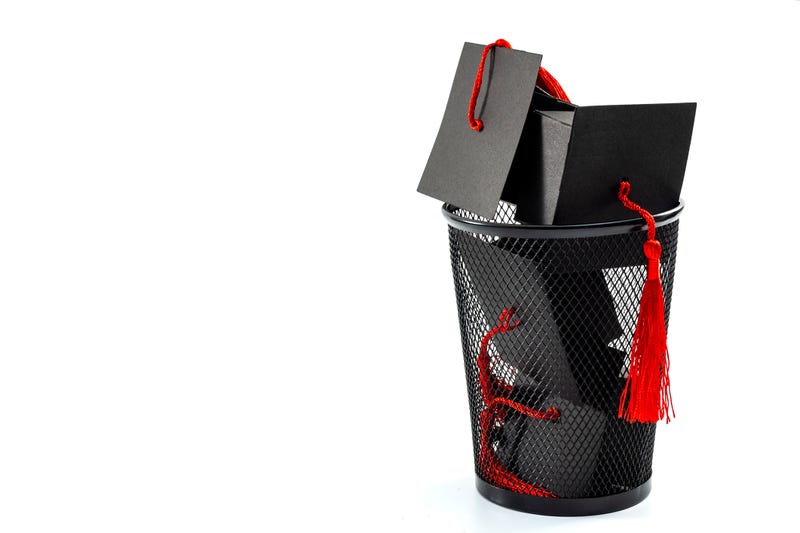
A poll conducted this month indicates that most Americans (56%) believe that college is not “worth the cost because people often graduate without specific job skills and with a large amount of debt to pay off.”
More than 1,000 participants responded to the NORC/Wall Street Journal poll from March 1 through March 13. It is far from the first evidence showing that Americans are college fed up with college costs.
Rising costs
Last year, Audacy spoke to two authors who studied the $1.7 trillion college debt crisis – Josh Mitchell, author of “The Debt Trap: How Student Loans Became a National Catastrophe” and Elizabeth Tandy Shermer, author of “Indentured Students: How Government-Guaranteed Loans Left Generations Drowning in College Debt”. They explained how college costs have ballooned over the past decades.
President Joe Biden has even announced a debt forgiveness program to help address the issue.
“A post-high school education should be a ticket to a middle-class life, but for too many, the cost of borrowing for college is a lifelong burden that deprives them of that opportunity,” said a White House fact sheet issued last August.
Just 42% of people who responded to the recent survey said college graduates would “have a better chance to get a good job and earn more income over their lifetime.”
According to the fact sheet, the total cost of both four-year public and four-year private college nearly tripled from 1980 to 2022, even after accounting for inflation. Federal support didn’t keep up. A Department of Education analysis found that the typical undergraduate student with loans graduates with nearly $25,000 in debt.
An admissions scandal and a pandemic
Just before the COVID-19 pandemic, the college admissions scandal broke. According to the U.S. Department of Justice, dozens of people were “involved in a nationwide conspiracy that facilitated cheating on college entrance exams and the admission of students to elite universities as purported athletic recruits.”
Arrestees included “Full House” actress Lori Loughlin and her husband, Mossimo Giannulli. Implicated schools included Yale University, Stanford University, University of Southern California, Wake Forest University and Georgetown.
Around a year after that scandal broke, COVID-19 pandemic lockdown orders disrupted the college experience for students across the country.
“When the pandemic lockdowns began in 2020 it pulled the rug out from under many people,” explained Robyn Fivush, Emory professor of psychology and a co-author of a study about student wellbeing amid COVID. “It was a particularly difficult time for first-year college students, many of whom were away from home for the first time and beginning to explore their adult identities in terms of their relationships, their academic interests and the world of ideas.”
Per the Associated Press, a decrease in enrollment that some thought of as a “pandemic blip” appears to be continuing. According to the Education Data Initiative, the number of total enrolled postsecondary students declined 3.29% year-over-year in 2020, “the most significant rate of decline in enrollment since 1951.”
From 2019 to 2022, nationwide, undergraduate college enrollment dropped 8%, said the AP, and according to the outlet, “economists say the impact could be dire.”
Changing attitudes
New Yorker columnist Jay Caspian Kang recently noted that admissions stress appears to be alive and well, at least for a certain corner of TikTok.
“Admissions at top-tier universities, which have certainly become far more competitive than they were when I was applying to school in the late nineties, are seen as a major contributor to this stress,” he wrote. “The evidence for this appears all over TikTok and Instagram, where thousands of high-school juniors and seniors post their ‘stats’ and then solicit advice and feedback on where they should apply.”
Kang said that these videos ultimately garner “seemingly earnest, yet undeniably cruel posts about how they found themselves sitting on the steps of the library at Columbia, or wherever else.”
Outside of admissions TikTok, a Morning Consult poll conducted last summer indicates that many Gen Z don’t trust higher education institutions.
“Gen Z respondents are 14 percentage points less likely to trust U.S. higher education relative to baby boomers,” said a poll summary. “This trust deficiency among Gen Z becomes starker when compared with parents. Only around 2 in 5 Gen Zers said they tend to trust U.S. universities compared with nearly 3 in 5 parents.”
Grayson Hart, a recent high school graduate quoted by the AP is one example of a Gen Z individual who decided to skip on college altogether.
“There were a lot of us with the pandemic, we kind of had a do-it-yourself kind of attitude of like, ‘Oh — I can figure this out,’” he said. “Why do I want to put in all the money to get a piece of paper that really isn’t going to help with what I’m doing right now?”
If colleges want enrollment to go up, they have to change things up, according to Rahul Choudaha, managing director of higher education research at Morning Consult.
“This clearly signals a red flag for higher education,” he said of the poll results released last summer, per Inside Higher Ed. “They cannot be resting on their laurels, … but they have to work more purposefully and intentionally to see why there are trust concerns among Gen Z and how they can overcome that.”
LISTEN on the Audacy App
Sign up and follow Audacy
Facebook | Twitter | Instagram
